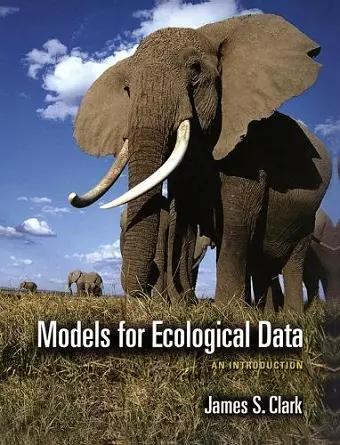Models for Ecological Data
An Introduction
Format:Hardback
Publisher:Princeton University Press
Published:11th May '07
Currently unavailable, and unfortunately no date known when it will be back
This hardback is available in another edition too:
- Paperback£32.00(9780691122625)

Clark brings emerging statistical approaches alive by putting the ecology first. Writing from the perspective of a field ecologist who must confront complex data without suppressing important detail, Clark describes new methods that are well matched to the richness of real ecological data. At last we have a text that makes these tools accessible to ecologists. -- Stephen R. Carpenter, University of Wisconsin, Madison Jim Clark has been able to pitch his message just right; one can see the ecological forest and the statistical, distributional, and computational trees at the same time. By reading this book, statisticians will gain an appreciation for the complexity of models in the ecological and environmental sciences, and ecologists will see the potential for hierarchical statistical modeling in their research arenas. Clark explains his material extremely well, but he is also rigorous in his statistical developments. -- Noel Cressie, Ohio State University Clark's book is monumental--I don't think there is any other source that provides this range of sources and methods. He presents a huge amount of useful material, focusing on the development and application of Bayesian hierarchical models for the analysis of ecological and environmental models. It's hard to imagine finding such a collection of information--the results of extensive experience with recent ecological, environmental, and statistical literature--in one place. And I heartily agree with the author's philosophical stances on simplicity and complexity, statistical pragmatism, and the need for common sense. -- Benjamin Bolker, University of Florida I strongly believe that this is potentially a landmark book in ecology. Its integration of modern statistical methods and ecological theory and data is fundamentally new. The book will train ecologists and other quantitative scientists in the 'new modeling techniques' that are becoming ever more prevalent in their field. In particular, the book describes how one should deal with complicated problems in which there is uncertainty in data, model, and parameters. James Clark does a wonderful job of integrating modern likelihood-based statistical methods as well as describing and demonstrating the advantages of the Bayesian approach. -- Christopher K. Wikle, University of Missouri, Columbia
Facing ecological data sets of unprecedented size and complexity, environmental scientists are struggling to understand and exploit powerful statistical tools for making sense of ecological processes. This work introduces them to these methods in modeling and computation. It also describes how complexity can motivate a shift to Bayesian methods.The environmental sciences are undergoing a revolution in the use of models and data. Facing ecological data sets of unprecedented size and complexity, environmental scientists are struggling to understand and exploit powerful new statistical tools for making sense of ecological processes. In Models for Ecological Data, James Clark introduces ecologists to these modern methods in modeling and computation. Assuming only basic courses in calculus and statistics, the text introduces readers to basic maximum likelihood and then works up to more advanced topics in Bayesian modeling and computation. Clark covers both classical statistical approaches and powerful new computational tools and describes how complexity can motivate a shift from classical to Bayesian methods. Through an available lab manual, the book introduces readers to the practical work of data modeling and computation in the language R. Based on a successful course at Duke University and National Science Foundation-funded institutes on hierarchical modeling, Models for Ecological Data will enable ecologists and other environmental scientists to develop useful models that make sense of ecological data. * Consistent treatment from classical to modern Bayes * Underlying distribution theory to algorithm development * Many examples and applications * Does not assume statistical background * Extensive supporting appendixes * Accompanying lab manual in R
"In summary, Models for Ecological Data is an important text for those interested in ecological problems, which require computationally intensive methods. The level of the text is such that the reader should have a strong quantitative background (masters degree or higher in a quantitative discipline). The accompanying lab manual is a must for those who have this text and want to put the material to practice. The text and accompanying lab manual would serve as a good textbook for a graduate course in quantitative ecology provided that the students have the necessary mathematical background."--Timothy J. Robinson, Journal of the American Statistical Association
ISBN: 9780691121789
Dimensions: unknown
Weight: 1616g
632 pages